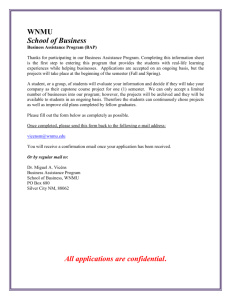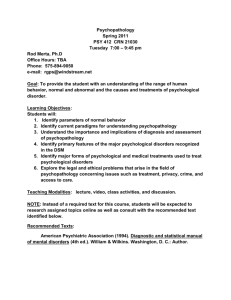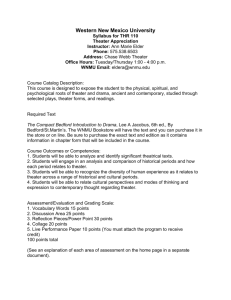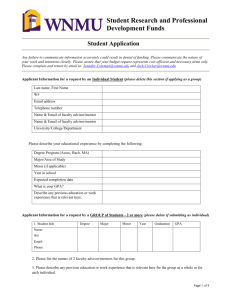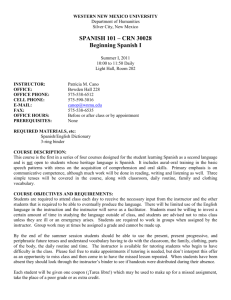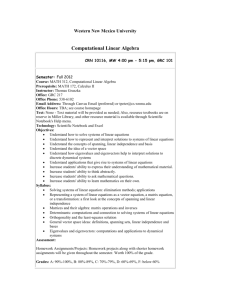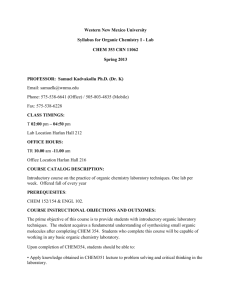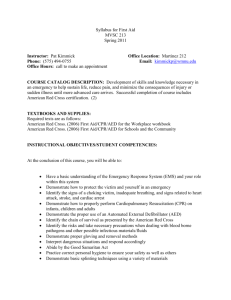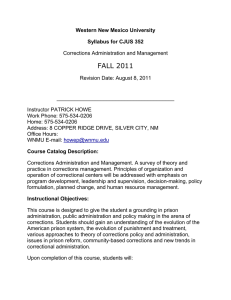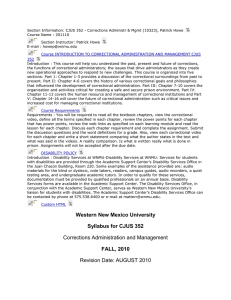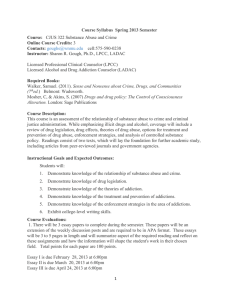Econ 200 10065 - Western New Mexico University
advertisement
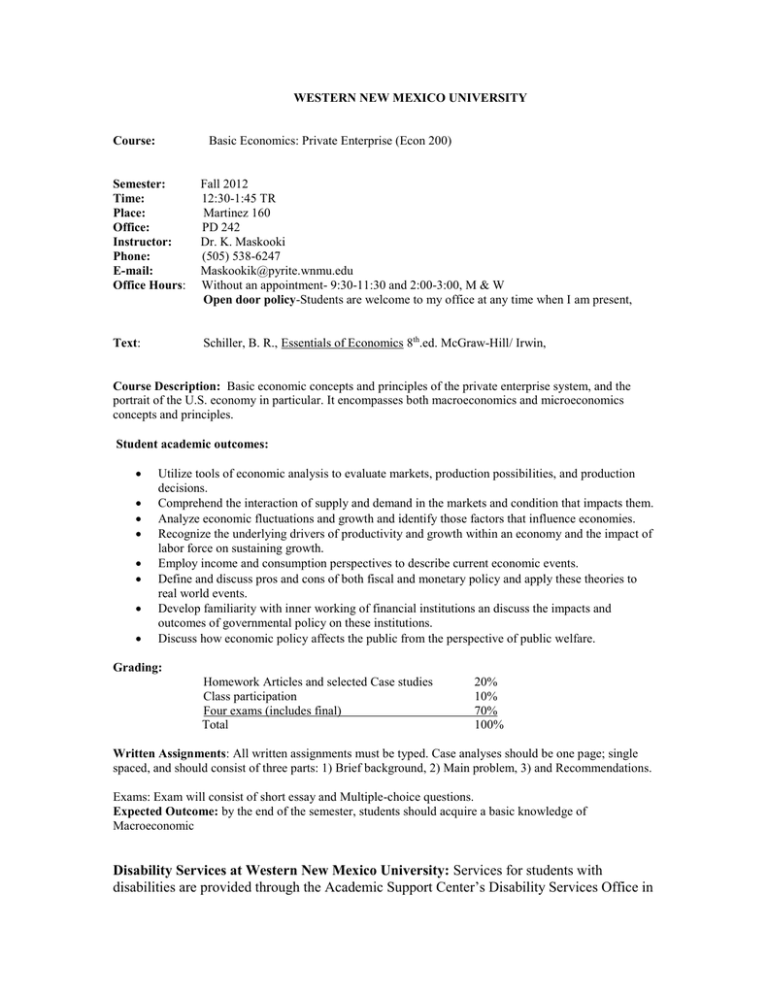
WESTERN NEW MEXICO UNIVERSITY Course: Basic Economics: Private Enterprise (Econ 200) Semester: Time: Place: Office: Instructor: Phone: E-mail: Office Hours: Fall 2012 12:30-1:45 TR Martinez 160 PD 242 Dr. K. Maskooki (505) 538-6247 Maskookik@pyrite.wnmu.edu Without an appointment- 9:30-11:30 and 2:00-3:00, M & W Open door policy-Students are welcome to my office at any time when I am present, Text: Schiller, B. R., Essentials of Economics 8th.ed. McGraw-Hill/ Irwin, Course Description: Basic economic concepts and principles of the private enterprise system, and the portrait of the U.S. economy in particular. It encompasses both macroeconomics and microeconomics concepts and principles. Student academic outcomes: Utilize tools of economic analysis to evaluate markets, production possibilities, and production decisions. Comprehend the interaction of supply and demand in the markets and condition that impacts them. Analyze economic fluctuations and growth and identify those factors that influence economies. Recognize the underlying drivers of productivity and growth within an economy and the impact of labor force on sustaining growth. Employ income and consumption perspectives to describe current economic events. Define and discuss pros and cons of both fiscal and monetary policy and apply these theories to real world events. Develop familiarity with inner working of financial institutions an discuss the impacts and outcomes of governmental policy on these institutions. Discuss how economic policy affects the public from the perspective of public welfare. Grading: Homework Articles and selected Case studies Class participation Four exams (includes final) Total 20% 10% 70% 100% Written Assignments: All written assignments must be typed. Case analyses should be one page; single spaced, and should consist of three parts: 1) Brief background, 2) Main problem, 3) and Recommendations. Exams: Exam will consist of short essay and Multiple-choice questions. Expected Outcome: by the end of the semester, students should acquire a basic knowledge of Macroeconomic Disability Services at Western New Mexico University: Services for students with disabilities are provided through the Academic Support Center’s Disability Services Office in the Juan Chacon Building, Room 220. Some examples of the assistance provided are: audio materials for the blind or dyslexic, note takers, readers, campus guides, audio recorders, a quiet testing area, and undergraduate academic tutors. In order to qualify for these services, documentation must be provided by qualified professionals on an annual basis. Disability Services forms are available in the Academic Support Center. The Disability Services Office, in conjunction with the Academic Support Center, serves as Western New Mexico University's liaison for students with disabilities. Academic Integrity Policy and Procedures: Each student shall observe standards of honesty and integrity in academic work as defined in the WNMU catalog. Violations of academic integrity include “any behavior that misrepresents or falsifies a student’s knowledge, skills or ability with the goal of unjustified or illegitimate evaluation or gain” (WNMU Faculty Handbook, 2008). Generally violations of the academic integrity include cheating and plagiarism. Refer to the catalog pages 60-61 for definitions. Penalties for infractions of academic integrity in this class are as follows: Zero grade recorded for any infraction. Plagiarism: “the intentional or unintentional representation of another’s work as one’s own without proper acknowledgement of the original author or creator of the work” (WNMU Faculty Handbook, 2008). The penalty for plagiarism this class is a zero grade recorded for any infraction. Cheating: “using or attempting to use unauthorized materials…and unauthorized collaboration with others, copying the work of another or any action that presents the work of others to misrepresent the student’s knowledge” (WNMU Faculty Handbook, 2008). The penalty for cheating in this class is a zero grade recorded for any infraction Communication Policy Statement regarding official email :WNMU’s policy requires that all official communication be sent via Mustang Express. As a result, all emails related to your enrollment at WNMU and class communication – including changes in assignments and grades – will be sent to your wnmu.edu email address. It is very important that you access your Mustang Express e-mail periodically to check for correspondence from the University. If you receive most of your email at a different address you can forward your messages from Mustang Express to your other address. Example: Martin Classmember was assigned a WNMU email address of classmemberm12@wnmu.edu but Martin would rather receive his emails at his home email address of martinclass@yahoo.com Martin would follow the direction provided at http://www.wnmu.edu/campusdocs/direction%20for%20forwarding%20email.htm Tentative Schedule- Subject to Change DATE Week 1 ASSIGNMENTS Explanation of course description, grading policy, and expectations regarding performance assessment at the end of the course Chapter 1, the challenge of Economics. Answer all questions and answer problems 1, 2, 3, and 6. Read the materials in the Appendix Week 2 Week 3 Week 4 Week 5 Discussion of Chapter 1 questions and problems. Lecture on Chapter 2, The U.S. Economy. Answer all questions and problems. Discussion of Chapter 2 questions and problems. Lecture on Chapter 3, Supply and Demand. Answer all even questions Discussion of Chapter 3 questions and problems First Examination- chapters 1, 2, 3 Lecture on Chapter 4, Consumer Demand – Answer all questions and problems Week 5 Week 6 Lecture on Chapter 5, Supply Decisions. Answer all odd questions. Lecture on Chapter 6, Competition Week 7 Week 8 Week 9 Week 10 Week 11 Week 12 Second Examination: Chapters 4, 5, and 6 Lecture on Chapter 7, Monopoly; Answer all odd questions and problems. Lecture on Chapter 8, The Labor Market. Answer all even questions Lecture on Chapter 9, Government Intervention. Answer all even questions Third Examination: Chapters 7, 8, and 9. Lecture on Chapter 10, The Business Cycle. Answer all even questions Lecture on Chapter 11, Aggregate Supply and Demand. Answer all even questions Week 13 Lecture on Chapter 12, Fiscal Policy Week 14 Lecture on Chapter 14, Monetary Policy. Answer all even questions. Week 15 Final Examination: Chapters 10, 11, 12, and 13. Go Mustangs---GOOD LUCK
